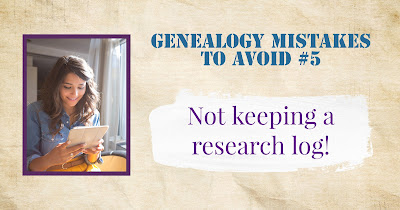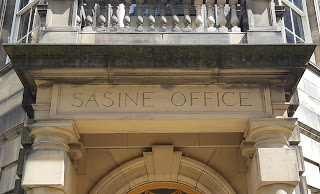‘Worthies of Dumfriesshire and Galloway’ was written by Jon Drylie and published in 1908. It is similar to other publications of the period, giving a biography of various characters in the area. Today’s story is that of Lawrence Murphy aka, ‘Tarry Larry’. The challenge for us as family historians is to separate fact from fiction.
Some research shows that Larry died in April 1902 in Dumfries Poorhouse. His age is recorded as 101; is this correct? I started doing some digging and on Findmypast I discovered Lawrence Murphy in the Merchant Seaman records. We’re told that he first went to sea as an apprentice in 1835 and that he was born on 10 March 1822. This is a long way off his date of birth being around 1800.
I checked Scotland's Criminal Database on Scottish Indexes and discovered that Lawrence was no stranger to the prison at Dumfries. In 1841 his age was recorded as 20, which was about right. Eight years later in 1849 he’s only 6 years of age. By 1857 he’s only 42 and by 1868 he was claiming to be born in 1811. This age massaging continues. By the census of 1891, when he was living in the poorhouse, his age was recorded as 88, giving him a birth year of 1803/4. Somehow by the time he died he had managed to increase his age again!
Bear these facts in mind as you read the chapter, ‘Tarry Larry’ from ‘Worthies of Dumfriesshire and Galloway’, written by John Drylie.
“Lawrence Murphy, who lived till he was over 100 years of age, and who died only a few years ago, was a native of Dumfries, and in the twentieth century he could relate to the smallest detail his recollections of the French prisoners in Dumfries at the beginning of last century. With them he was on intimate terms, and acted as a sort of page boy. For them he made excursions to Lochar Moss and the Long Wood for puddocks, frogs, and hedgehogs, on which the French officers would dine. Larry, as he was familiarly called, took to a seafaring life in his early days, and for almost half-a-century he followed that vocation, during which time he saw a good deal of the surface of the globe. He sailed a lot between Canada and Britain, and he used to say that "the very dogs in Quebec knew him."Once when sailing on the "John Wilson," which was bringing home timber from Quebec, and which belonged to Laird Thomson, commonly called "the Laird," the skipper of the bark refused to allow the sailors the usual allowance of "grog." The weather was bitterly cold at the time, and "Larry," who was generally the ringleader in any adventure, undertook to supply the crew with a share of the special brandy which was contained in a big jar enclosed in a wicker case for the Laird's delectation. Larry's "modus operandi" was as follows. Cute enough not to touch the seal he turned the jar up-side down, and boring a hole into it, he extracted the liquor, which was substituted by salt water, the hole plugged up, and the jar returned to its proper place. The Laird naturally was amazed at the transformation of his wine into salt water, and he thought that the agent at Quebec had played a practical joke upon him. It was a year after that before Larry found occasion to explain the real reason for the disappearance of the liquor. He was rafting timber on the Nith at the foot of Bank Street, and when the Laird unwarrantably "yoked on " Larry, the latter took the Laird off with the remark - "Hech, ye needna be sae bubbly; we did ye wi' the brandy last year."
During his seafaring career, Larry was an adept at smuggling tobacco. He had no faith in the stereotyped false-bottomed chests, or any her worked-out fakes, but like Myles Crow, he was original in his ideas, and fortunately or unfortunately as readers may think, Larry was more successful than that unfortunate whom we met in a previous chapter. Sometimes Larry would tie the tobacco into a tight bundle, climb to the truck of the mast, secure the bundle there with a cord, and remove it from its lofty resting-place on the quiet. Another plan was to put the weed into an old canvass bag, tie it round and round with ropes, and then besmear the whole with tar. It is needless to say that such an article got little investigation from the officers of excise.

Tired of the sea, Larry settled down in Dumfries, and was principally employed rafting on the river. He had a constitution of iron, and was devoid of all fear. About sixty years ago the scaffolding at the Martinton Railway Bridge, on the Castle Douglas Railway, which was then being built, was carried down the Nith by a flood, and a considerable quantity of it was stopped by the piers at the New Bridge, Larry was swung from the bridge by a waistband and a rope, and by this means he tied ropes to the planking and machinery swirling in the flood below, which were then drawn safely to the side. Larry might be said to have been a water-kelpie. On one occasion someone, by way of a joke, had nut an advertisement in the newspapers stating that on a certain day an American diver would dive into the Nith from the Old Bridge. A large crowd of people turned out to witness the exhibition, but the Yankee failed to appear, and Larry, always ready to please, said: "We'll no see folks cheated; I'll dae't mysel'." Thereupon, Larry, fully dressed, dived from the Bridge to the great amusement of the people. He was warmly received on swimming to the shore, and like Tam Broon, who had accomplished the same feat several times, he was trotted across to the "Grapes Inn," and royally treated for his pluck.
Larry was also instrumental in saving a good many lives. On one occasion when he was about sixty years of age, two boys got beyond their depth at the "gullet pool" near the Caul. A man named Glendinning, who was rafting wood below Bank Street, ran to the spot, dived in after them, and disappeared. Larry, who had been similarly employed, stripped off his jacket and waistcoat, plunged into the river, and succeeded in rescuing one of the boys, Bob Bennet, a celebrated Maxwelltown worthy. also lent a helping hand, but as Larry said with a grin - "He was nae use." After Larry had brought the first boy safely ashore, the cry went up- "There's another!" and again our worthy dived and brought up the second boy. "Where's Glendinning?" was the next cry, and Larry with his unconscious humour, asked if there was "mair yet," and then diving brought up Glendinning, who, however, had succumbed in his effort to rescue the boys.
Shortly after that a painter named M'Culloch got into difficulties while bathing at the same spot, and Larry was again instrumental in saving life. Subsequently Larry came across this same man in a public-house, and as a reward, Larry wanted him to "stand his hand"; but the painter in an ungenerous and uppish fashion ordered Larry off, whereupon the latter retorted - "Ye needna be sae big; yo wisna sayin' that when ye wis gruppin' at the chuckie stanes at the bottom o' the gullet pool."
When Larry became unable through advancing years to follow the employment of rafting, his principal source of income was from tarring fences and wooden sheds, etc. When tarring high buildings, his experience before the mast stood him in good stead, and like the baker, the sweep, and the coalman, he bore marks of his profession, both on his clothes and on his hands and face. It was then that the younger generation bestowed upon him the nickname of "Tarry Larry." After the death of his wife, the poor old man fell on evil times. He lived in a little barrow shed in the yard of the White Hart Hotel, the site of which is now occupied by a big drapery establishment in Buccleuch Street, This shed was more like a dog's kennel than the abode of a human being, and it was pitiful to see him crawl into this box at night, and pull an old rag down over the front, which was all the protection he had from the strongest gale and the keenest frost. On one occasion he was found lying outside his hut, with his hair frozen fast to the ground, and it was only after hot water had been applied to his locks, that he was released. No ordinary man could have endured a tithe of the privations that Larry survived and indeed seemed to thrive upon.
Even in his later years, Larry was renowned as a pugilist, and being possessed of abnormal strength, he generally came out of any broil unhurt. Even when his legs would scarcely keep his body in an upright position, he would support his back against a wall and continue the fight with vigour, and sometimes his friends would hold him up from behind, while Larry kept his fists going like battering rams. One winter he was found lying covered with snow, only one foot being visible above the white blanket. It was then that he entered the Poor-house for the first time at the age of 81. In the Poor-house he was well behaved, and he was the generally accepted chairman of the room in which he and a number of other old people dwelt. His fighting spirit remained with him to the last, as will be evident from the story that when Larry was 98 years of age, he quarrelled with James M'Inroe, a frisky emigrant from the Emerald Isle, who was 88 years of age. Larry, who always respected the rules of the house," went to the Governor, and said:-"Please, sir, may I ha'e five meenits o' Jimmy M'Inroe ootside?" Of course the request was not granted, but Larry stoutly maintained that he could have settled Jimmy in two meenits."

Larry had only been a month or six weeks in the Poorhouse when he began to make approaches to the governor with the intention of asking permission to go and get his whistle wet. For some reason or other Larry's heart failed him at the critical juncture, and he always left the governor's presence without stating his errand. Probably it was the fear of being refused that prevented him from expressing his wish, but at last he could stand it longer-for Larry, it must be explained, was a man who could get drunk and sober two or three times a day before he went into the Poor house and being granted permission he remained outside for three or four days in a perpetual state of intoxication. Subsequently an arrangement was come to between Larry and the inspector of poor, whereby Larry consented to go to the Poorhouse on condition that he got out for an afternoon every month. Regularly for many years after that, the poor old man was allowed out to see his friends once a month, and, as regularly, Larry got roarin' fou," the cab men having a standing order to convey him to the Poorhouse from wherever they found him lying about the town. Latterly, our aged worthy was unable to walk out of the house himself, his legs, which for many years had been his greatest, and, indeed, his only physical defect, having become completely useless; but, notwithstanding, he was enabled, through the goodness of the inspector, to pay his monthly calls as usual by means of a cab, which was provided for his use on one afternoon every month. A cab was hired for the afternoon, the driver taking his instructions from Larry, and in this way he continued his periodical visits at his ease and comfort, and in a style worthy of his venerable age. Larry at last passed away in Dumfries Poorhouse on the 11th of April, 1902, in the 102nd year of his age.”
What a story! How can we separate fact from fiction? We can compare what we’re told, whether in a family story or a printed book, with original sources. We can be fairly confident that Larry did not go foraging for frogs on Lochar Moss to feed the French officers! The story about saving lives in the river may well be true, but he was a lot younger than he said and I suspect the story is greatly exaggerated.
One thing we do know, however, is that Larry was certainly a character. Even if some of the stories are tall tales, they are very entertaining and I would be very happy to have him in my family tree!
These volumes rarely had large print runs. Although they pop up on auction sites from time to time, a good place to hunt for them is in local libraries. Many libraries now have their catalogue online. Note that this will be separate to the archive catalogue, even if the library and archive are in the same building. If you live in the UK you may be able to access some volumes through ‘inter-library loans’.
Follow our blog for more from ‘Worthies of Dumfriesshire and Galloway’.














.png)







